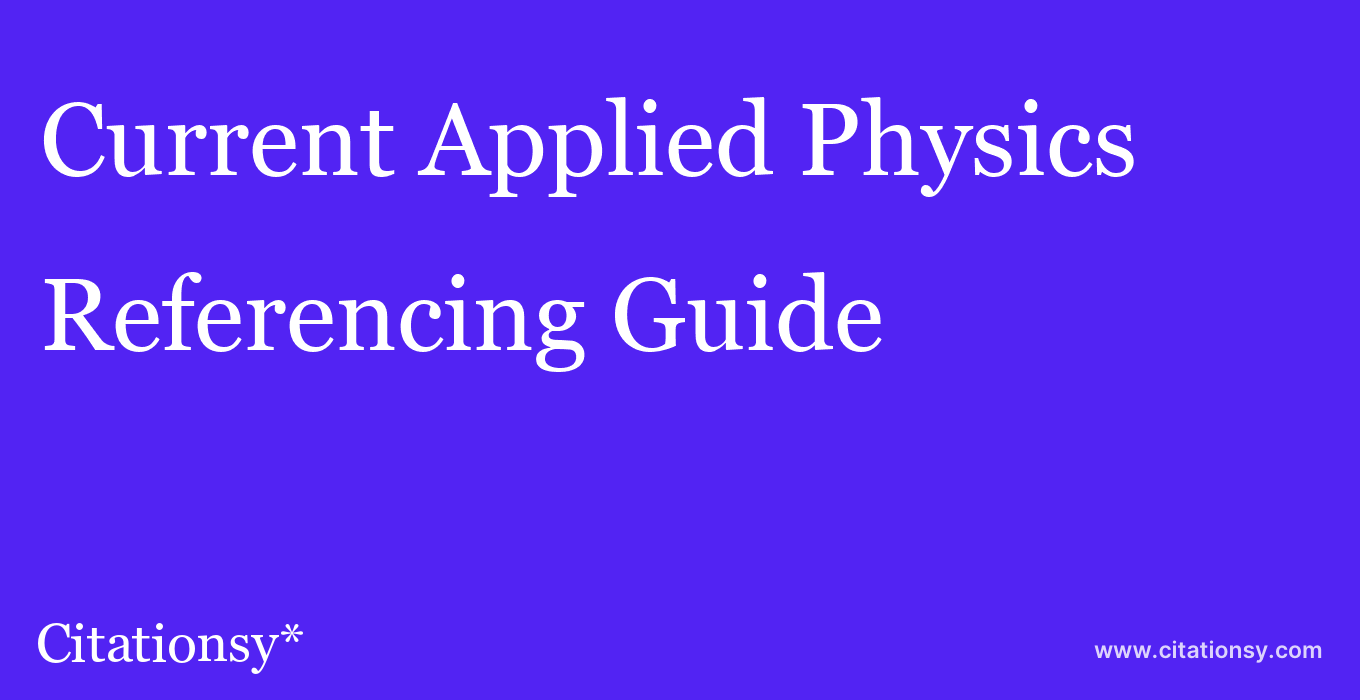Current Applied Physics Referencing Guide
(updated Jul 2024)
Last updated:
How to do citations in Current Applied Physics style?
This is the Citationsy guide to Current Applied Physics citations, reference lists, in-text citations, and bibliographies.
Automate citations and referencing with our tool, Citationsy. It’s free to try and over 400 000 students and researchers already use it.
This is the Citationsy guide to Current Applied Physics citations, reference lists, in-text citations, and bibliographies.
The complete, comprehensive guide shows you how easy citing any source can be. Referencing books, youtube videos, websites, articles, journals, podcasts, images, videos, or music in Current Applied Physics.
Click here to give it a try.

How do you cite a book in the Current Applied Physics referencing style? (2024 Guide)
A book citation in Current Applied Physics always includes the author name(s), the publication year, the book title, and the publisher. Here’s an exampleHere’s an example book citation in Current Applied Physics using placeholders:
[1]
F.N. Last Name, Title, Edition, Publisher, City, 2000.
Current Applied Physics citation:
[1]
M. Angelou, I Know Why the Caged Bird Sings, 1st ed., Random House, New York, 1969.
Automate citations and referencing in Current Applied Physics with our tool, Citationsy.
It’s free to try and over 400 000 students and researchers already use it.
Click here sign up
How to reference a journal article in the Current Applied Physics citation style?
How do you cite scientific papers in Current Applied Physics format?
The basic information included in your citation will be the same across all styles. However, the format in which that information is presented is somewhat different depending on style you need. To cite a paper in Current Applied Physics, follow this exampleHere’s a Current Applied Physics journal citation example using placeholders:
[1]
Author1 LastnameA.F., Author3 LastnameA.F., Title, Container. Volume (2000) pages Used. https://doi.org/DOI.
[1]
C. Petit, J. Sieffermann, Testing consumer preferences for iced-coffee: Does the drinking environment have any influence?, 18 (2007) 161-172. https://doi.org/10.1016/j.foodqual.2006.05.008.
Automate citations and referencing in Current Applied Physics with Citationsy. Get started for free
How to cite a website in a paper in Current Applied Physics style?
Although not all open web content is appropriate as scholarly evidence, you might find yourself wanting to reference a web page in Current Applied Physics. Here’s a quick and simple guide on how to do itHere’s an Current Applied Physics example website reference:
[1]
Author1 LastnameA.F., Author2 LastnameA.F., Title, (2000). https://www.example.com (accessed July 27, 2024).
https://www.theguardian.com/world/2008/nov/05/uselections20083
on The Guardian website:
[1]
M. Tran, Barack Obama To Be America’s First Black President, (2008). https://www.theguardian.com/world/2008/nov/05/uselections20083 (accessed July 27, 2024).
Citing websites and links in Current Applied Physics is much easier with the Citationsy Chrome Extension →
Cite Current Applied Physics with Citationsy. Get started for free
How to cite a YouTube video Current Applied Physics in 2024
Are you watching a YouTube video and found something worth sharing in your research paper? Here’s how to cite a YouTube video in Current Applied PhysicsHere’s a Current Applied Physics citation YouTube video example:
[1]
ChannelName, Title, YouTube. (2000). https://www.youtube.com/watch?v=XXXXXX (accessed July 27, 2024).
[1]
Pixar, Pizza Clip — Inside Out, YouTube. (2015). https://www.youtube.com/watch?v=8W6rntBADUQ (accessed July 27, 2024).
How to cite a podcast using Current Applied Physics referencing style
Are you listening to a podcast and you want to use it in your essay or presentation? Here’s how to cite it in Current Applied PhysicsIt is becoming more and more common to reference podcasts in essays or other school work.
Here’s how to reference a podcast it in Current Applied Physics.
[1]
F. Lastname, Title, (2000). http://www.example.com (accessed July 27, 2024).
[1]
This American Life, 640: Five Women, (2018). https://thisamericanlife.org/640/five-women (accessed July 27, 2024).
Cite podcasts in Current Applied Physics with Citationsy, a referencing app used by over 400 000 students.
Get started for free
How to cite a piece of music or a song using Current Applied Physics referencing style?
Are you into rock, pop, heavy metal, hip hop, jazz, electronic, or classical music and would like to cite or reference one of your favourite songs? Here’s how to do it in Current Applied PhysicsAn example song citation in Current Applied Physics.
[1]
F. Lastname, Song Title, 2000. http://www.example.com (accessed July 27, 2024).
[1]
The Beatles, Here Comes the Sun, 1969. https://itunes.apple.com/us/album/here-comes-the-sun/401186200?i=401187150 (accessed July 27, 2024).
You can automate citing and referencing any source in Current Applied Physics using Citationsy.
Cite sources using the Current Applied Physics Citation Machine
Cite Current Applied Physics with Citationsy, a referencing app used by over 400 000 students. Get started for free
 Sign in with Apple
Sign in with Apple account
account